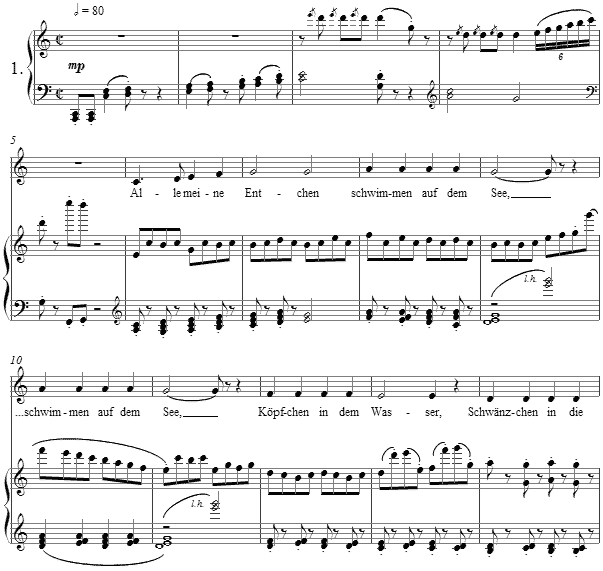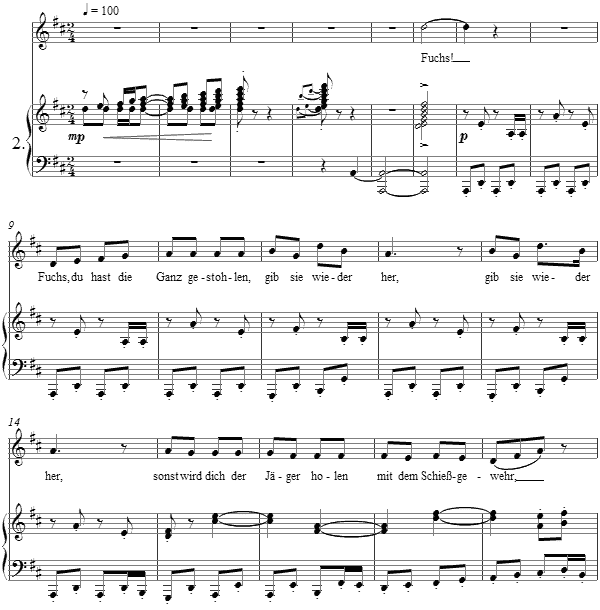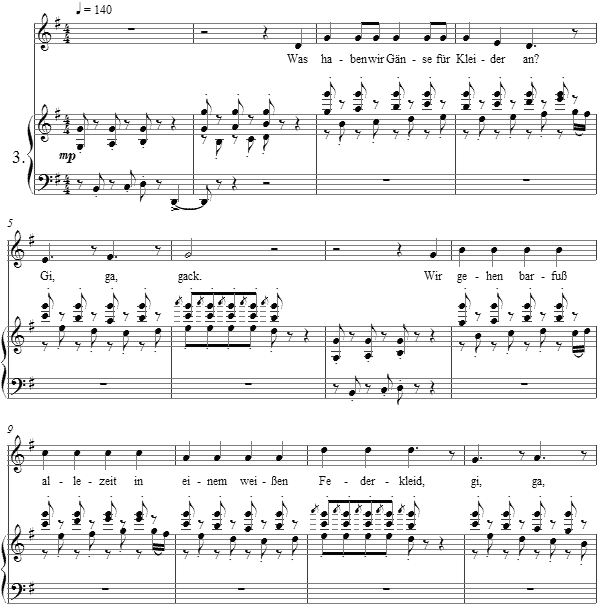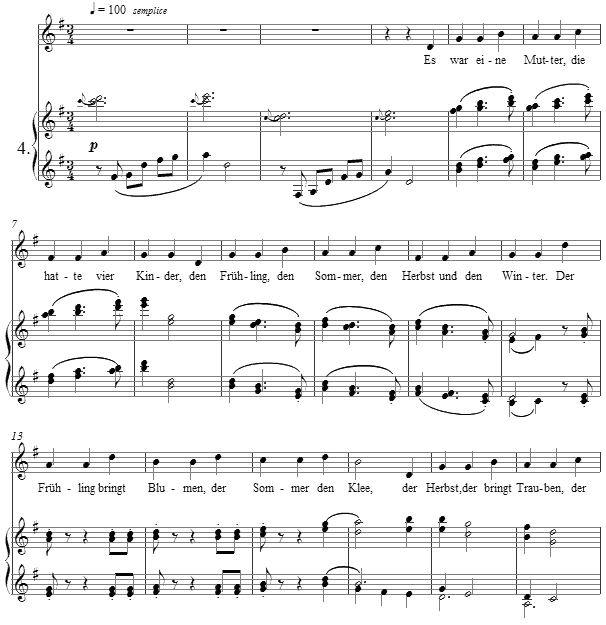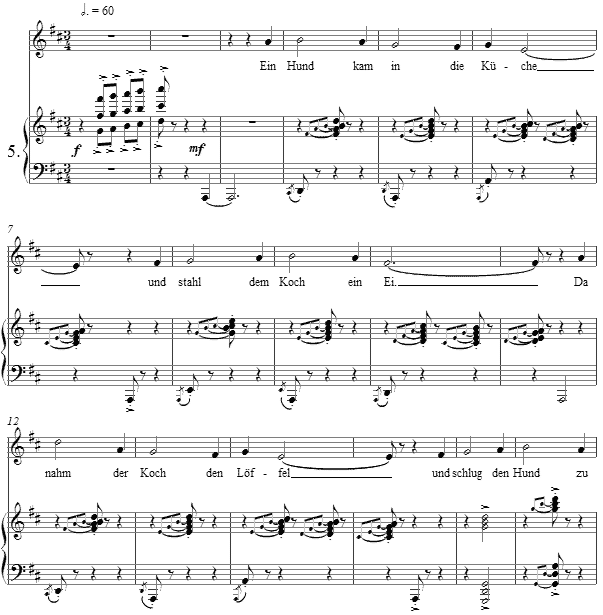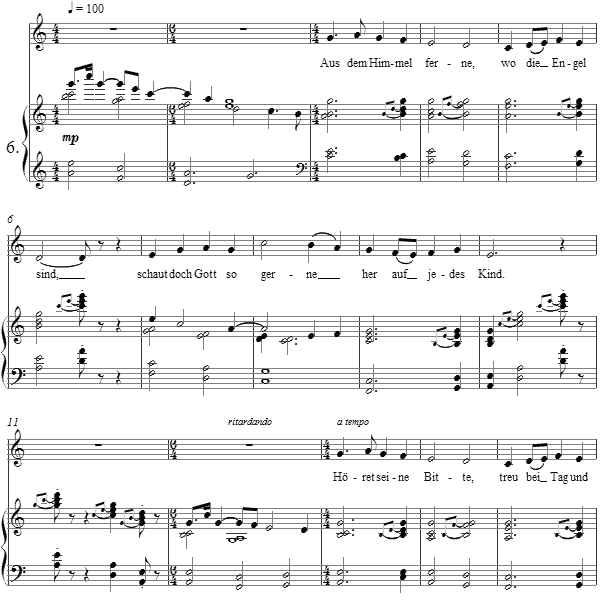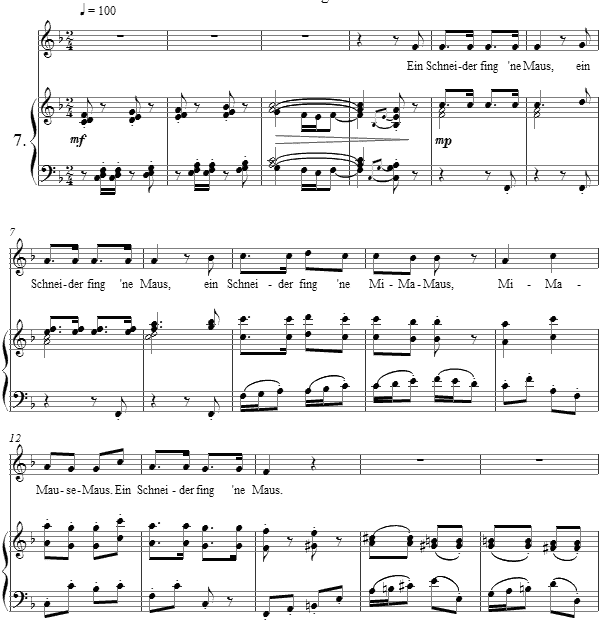Music and Texts of GARY BACHLUND
Vocal Music | Piano | Organ | Chamber Music | Orchestral | Articles and Commentary | Poems and Stories | Miscellany | FAQs
Kinderlieder - (2009)
Ernst Anschütz, Hoffmann von Fallersleben and folk sources
for medium voice and piano
i. Alle meine Entchen - Ernst Anschütz (1780-1861) and others [ 5 pages, circa 2' 40" ]
Alle meine Entchen
||: Schwimmen auf dem See, :||
Köpfchen in dem Wasser,
Schwänzchen in die Höh.
Alle meine Täubchen
||: Gurren auf dem Dach, :||
Fliegt eins in die Lüfte,
Fliegen alle nach.
Alle meine Hühner
||: Scharren in dem Stroh, :||
Finden sie ein Körnchen,
Sind sie alle froh.
Alle meine Gänschen
||: Watscheln durch den Grund, :||
Suchen in dem Tümpel,
Werden kugelrund.
Alle meine Fröschlein
||: Hüpfen auf und ab :||
Schrein dabei recht lustig,
Quack, quack, quack, quack ,quack.
Alle meine Puppen,
||: Susi und Marie :||
Schlafen in der Wiege,
Bis ich wecke sie.
Alle meine Kinder
||: Tanzen lustig heut' :||
Tanzen voller Freude
In der Sommerzeit.
ii. Fuchs, du hast die Gans gestohlen - Ernst Anschütz (1780-1861) [ 3 pages, circa 1' 35" ]
Fuchs, du hast die Gans gestohlen,
||: gib sie wieder her, :||
||: sonst wird dich der Jäger holen, mit dem Schießgewehr. :||
Seine große lange Flinte
||: schießt auf dich den Schrot, :||
||: dass dich färbt die rote Tinte und dann bist du tot. :||
Liebes Füchschen lass dir raten,
||: sei doch nur kein Dieb, :||
||: nimm, du brauchst kein Gänsebraten, mit der Maus vorlieb. :||
iii. Was haben wir Gänse für Kleider an? - Hoffmann von Fallersleben (1798-1874) [ 3 pages, circa 1' 30" ]
Was haben wir Gänse für Kleider an?
gi, ga, gack.
Wir gehen barfuß allezeit
in einem weißen Federkleid,
gi, ga, gack.
Wir haben nur einen Frack.
Was trinken wir Gänse für einen Wein?
gi, ga, gack.
Wir trinken nur den stärksten Wein,
der ist der Gigagänsewein,
gi, ga, gack.
ist stärker als Rum und Arrak.
Was essen wir Gänse für eine Kost?
gi, ga, gack.
Im Sommer geh'n wir auf die Au,
im Winter speist die Bauersfrau,
gi, ga, gack,
Uns aus dem Hafersack.
iv. Es war eine Mutter - Volkslied [ 2 pages, circa 1' 30" ]
Es war eine Mutter, die hatte vier Kinder,
den Frühling, den Sommer, den Herbst und den Winter.
Der Frühling bringt Blumen, der Sommer den Klee,
der Herbst, der bringt Trauben, der Winter den Schnee.
Und wie sie sich schwingen im lustigen Reihn,
so tanzen und singen wir fröhlich darein.
v. Ein Hund kam in die Küche - Volkslied [2 pages, circa 50" ]
Ein Hund kam in die Küche
und stahl dem Koch ein Ei.
Da nahm der Koch den Löffel
und schlug den Hund zu Brei.
Da kamen die anderen Hunde
und gruben ihm ein Grab
Und setzen ihm ein'n Grabstein....
Auf dem geschrieben stand:
Ein Hund kam in die Küche
und stahl dem Koch ein Ei.
vi. Nachtgebet - Volkslied [ 2 pages, circa 1' 55" ]
Aus dem Himmel ferne,
Wo die Engel sind,
Schaut doch Gott so gerne
her auf jedes Kind.
Höret seine Bitte
treu bei Tag und Nacht,
nimmt's bei jedem Schritte
väterlich in acht.
Gibt mit Vaterhänden
ihm sein täglich Brot,
hilft an allen Enden
ihm aus Angst und Not.
Sagt's den Kindern allen,
daß ein Vater ist,
dem sie wohlgefallen,
der sie nie vergißt!
vii. Ein Schneider fing 'ne Maus - Volkslied - [ 8 pages, circa 3' 30" ]
||: Ein Schneider fing 'ne Maus, :||
Ein Schneider fing 'ne Mi-Ma Maus,
Mi-Ma Mause-Maus.
Ein Schneider fing 'ne Maus.
||: Was macht er mit der Maus? :||
Was macht er mit der Mi-Ma Maus,
Mi-Ma Mause-Maus?
Was macht er mit der Maus?
||: Er zieht ihr ab das Fell, :||
Er zieht ihr ab das Mausefell,
Mi-Ma-Mausefell.
Er zieht ihr ab das Fell.
||: Was macht' er mit dem Fell? :||
Was macht' er mit dem Mausefell?
Mi-Ma-Mausefell?
Was macht' er mit dem Fell?
||: Er näht sich einen Sack. :||
Er näht sich einen Mausesack.
Mi-Ma-Mausesack.
Er näht sich einen Sack.
||: Was macht er mit dem Sack? :||
Was macht er mit dem Mausesack,
Mi-Ma-Mausesack?
Was macht er mit dem Sack?
||: Er tut hinein sein Geld, :||
Er tut hinein sein Mausedeld,
Mi-Ma-Mausedeld.
Er tut hinein sein Geld.
||: Was macht er mit dem Geld? :||
Was macht er mit dem Mausedeld,
Mi-Ma-Mausedeld?
Was macht er mit dem Geld?
||: Er kauft sich einen Bock, :||
Er kauft sich einen Mausebock,
Mi-Ma-Mausebock.
Er kauft sich einen Bock.
||: Was macht er mit dem Bock? :||
Was macht er mit dem Mausebock,
Mi-Ma-Mausebock?
Was macht er mit dem Bock?
||: Er reitet durch die Welt. :||
Er reitet durch die Mausewelt,
Mi-Ma-Mausewelt.
Er reitet durch die Welt.
||: Was macht er in der Welt? :||
Was macht er in der Mausewelt,
Mi-Ma-Mausewelt?
Was macht er in der Welt?
||: Er wird ein großer Held. :||
Er wird ein großer Mauseheld,
Mi-Ma-Mauseheld.
Er wird ein großer Held.[ 25 pages plus cover and contents, circa 13' 30" ]
Ernst Anschütz (1780-1861)
Two of these beloved children's texts, "All meine Entchen" and "Fuchs, du hast die Gans gestohlen," are by German author, Ernst Anschütz (1780-1861). Among his serious works, there is his story of the death of Johann Christian Woyzeck in 1824, leading to Georg Büchner's play, Woyzeck, and thence to Alban Berg's 1925 Wozzeck, which for me shows that artists stand on the creative shoulders of those who come before them. Anschütz was a teacher in Leipzig most of his life, during which he wrote most of his poetry. In addition he was a composer and organist. Another of the texts is by Hoffmann von Fallersleben, settings of his texts being found in the Author's Index - F. The remaining texts, as well as additional strophes in the first setting come from various anonymous sources, and each is noted simply as "Volkslied."
Repetition is a feature of children's rhymes and games, for this the texts above are complete with repeat marks as is common. My following rhymed paraphrases are intended to give clarity to both the sense and delightful nonsense of the texts above. No repeats as are seen in the German texts and songs settings are noted below, but rather a slightly different scansion to capture something more than an absolute literal translation.
i. All My Little Ducklings
All my little ducklings,
Swimming in the lake,
Heads dunk in the water,
As little tails do shake.
All my little doves,
Cooing in the eaves,
One flies up, away,
And then another leaves.
All my little chickens
Scratch about in straw;
Finding yummy seeds,
They chuckle and guffaw.
All my little geese
Waddle to and fro,
Seeking some nice splashy pond
To fatten as they grow.
All my little froggies
Hop hither and yon,
Crying out quite loudly,
Croaking on and on.
All my dollies,
Susi and Marie,
Sleep now in their cradle,
Till they wake with me.
All the little children
Dance the hours away,
Prancing filled with joy
Throughout a summer's day.
This setting ranges through a number of harmonic domains, generally in half step relation to a preceding strophe, and each with a varying texture and mood.
ii. Fox, you've stolen the goose
Fox, you've stolen the farmer's goose,
You must bring it right back here,
Or I will fetch the hunter
and his trusty hunter's gear.
His buckshot-loaded shotgun
Is large and long and true,
You will soon be stained with red,
For death will come to you.
Little lovely fox, take heed;
Don't remain a thieving cheat.
You don't need a silly goose
When you've got silly mice to eat.
The last strophe turns sympathetic, as the alternative between seemingly "moral" choices and consequences within the genre of children's rhymes is given by Anschütz.
iii. What Do We Geese Wear For Clothes?
What do we geese wear for clothes?
Ha-hee-honk!
We go quite barefoot, heels and toes,
In our snow-white feathery pose,
Ha-hee-honk!
As everybody knows!
What do we geese drink for wine?
Ha-hee-honk!
What we drink is goose-glog fine,
From our own gi-ga-goosey stein,
Ha-hee-honk!
Not rum, Arrack nor fruit of the vine!
From what goose cuisine do we eat?
Ha-hee-honk!
In summer the fields are quite replete;
In winter oats are strewn at our feet.
Ha-hee-honk!
Mrs. Farmer's oat sack is so sweet!
There is a musical onomatopoeia of squawking which answers phrases in the vocal line. The secco texture contrasts with the surrounding settings, in this amusing text by Hoffmann von Fallersleben.
iv. A Mother's Four Children
A mother's four children, whose names we know well,
Are Spring, Summer, Autumn and Winter's Noel.
Spring brings her flowers, and Summer's green bright,
Autumn brings grapes, and Winter snows white.
And as they go round in their seasons' advance,
We celebrate each, in our songs and our dance.
A contrasting lyricism is featured in this gentle setting of an anonymous Volkslied. The last strophe becomes yet more lyrical.
v. A Dog Ran Through the Kitchen
A dog ran through the kitchen,
Then stole an egg, then fled.
The cook took quick a serving spoon
And struck that mongrel dead.
For this the other curs did grieve,
And dug a grave for him,
And set atop a marker,
Which read in few words, grim:
"A dog ran through the kitchen,
Then stole an egg, then fled."
Opening with aggressive parallel sevenths, this simple song finds its way into many circumstances, among them in the play, Waiting for Godot in which Vladimir sings the strophes which are meant to constantly circle back to an expression of doom which cannot be avoided. Additionally the tale and its title were used in a German crime thriller of the same name in 2002. Rather than play the children's game of repetition, this setting ends with the repeat of the first two lines.
vi. Evening Prayer
From out the heavens high above,
With angels, meek and mild,
A loving God looks down with love
On each and every child.
Heed His loving guidance,
True by day and night;
Be known to live with patience
In a Father's patient sight.
Daily bread is given thus
By our Father's hand,
And in those times which worry us,
Beside us does God stand.
Say to all God's children,
God watches from above;
That we not forget this, then,
But think on God's true love.
Chorale-like, this setting builds gentle musical variations on the prayer, much in a five-note density. The last strophe departs from the known melody line, now also a variation thereto.
vii. A Tailor Caught a Mouse
A tailor caught a mouse,
Indeed he caught a mouse,
Oh yes, he trapped a mi-ma-mouse,
Oh my! A mi-ma-mouse,
That tailor caught a mouse.
What happened to that mouse?
What did he do, that louse?
Oh yes, he snared a mi-ma-mouse,
Oh my! A mi-ma-mouse,
That tailor killed the mouse.
The pelt came off that mouse.
Peeled as if a furry blouse.
Oh yes, he skinned that mouse's blouse,
Oh my! Poor mi-ma-mouse,
That tailor skinned the mouse.
What happened to that pelt?
What use for a mouse's pelt?
Oh yes, he ripped that mouse's pelt,
Oh my! Poor mi-ma-mousy-pelt,
The tailor stripped the pelt.
The tailor made of fur-lined sack!
He stitched it up, from front to back!
Oh yes, he sewed that mouse-like sack,
Oh my! That mi-ma-mousy sack,
The pelt became a sack.
What of that mouse-skin sack?
Ah, why that mouse attack?
Yes, now he had a mouse-skin sack,
Oh my! That mi-ma-mouse-fur sack,
The tailor had his sack.
In it, he put his gold,
Yes, gold that sack would hold.
That tailor made the sack for gold,
With that mi-ma-mouse-sack's gold,
The tailor bought and sold.
A furry sack of gold?
What would the future hold?
That tailor made the sack for gold,
Oh! That mi-ma-mouse-sack's gold,
The tailor grew quite bold.
The tailor bought a goat
With gold from the mouse-skin tote.
Yes, now he had a mouse-made goat,
And o'er that mi-ma-mouse-fur goat,
The tailor now could gloat.
What of that Billy-goat?
The mouse the tailor once did smote
Was now tied on to the mousy-goat.
Oh my! That mi-ma-mouse-fur goat,
The tailor now did gloat.
He rode it through the land.
He thought himself quite grand.
With mouse-sack, mouse-goat, he had planned
To be quite mi-ma-mousy-grand,
And ride throughout the land.
What led him further on?
By what then was he drawn?
With mouse-sack, mouse-goat, and his tailor brawn
He was quite mi-ma-mousy-drawn
To triumphs, whereupon....
He would heroic be!
With mouse-sack, mousy-goat did he
Ride out, a hero boastfully
And mi-ma-mousey would then he
Filled with mousy glory be!
As finale to this set of songs, a rollicking set of variations in various keys tells the tale of the poor mouse and hapless tailor whose self-imagined, vain and "mousy" glory is in of itself a lesson to children.
The end of this cycle allows a final bit of vocal heroism for the singer, rising to the highest tessitura for a jaunty, bravura ending to these "children's songs," which of course are intended for adults who we know are the greatest of children.
Rhymed paraphrases Copyright © Gary Bachlund All international rights reserved.
The score for Kinderlieder is available as a free PDF download, though any major commercial performance or recording of the work is prohibited without prior arrangement with the composer. Click on the graphic below for this piano-vocal score.

